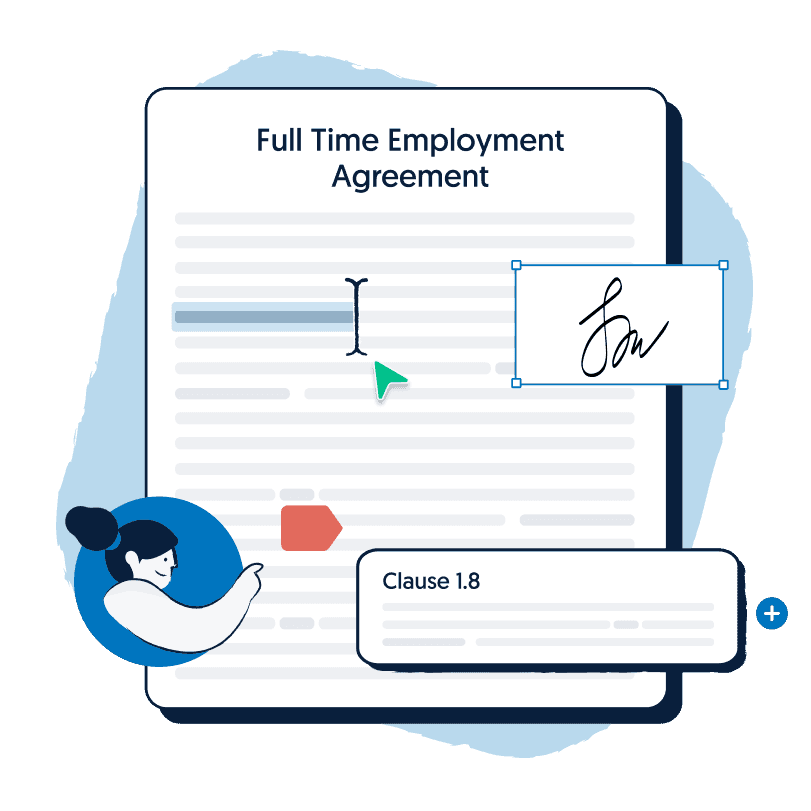Penalty rates were first introduced to Australia in the 1940s. The policy was encouraged by various unions and state regulatory bodies. The argument was that employees deserved a higher pay rate when asked to work outside normal hours. Changes to workplace environments, types of industries, and the tasks employees are expected to undertake have all played a role in changes since. Accordingly, it is very important for employers to keep afoot of any and all changes as industry develops and the law adapts. There are some universally applicable times where penalty rates apply. However, much of it depends on your own unique circumstances. In this article, we’ll discuss when penalty rates apply and how to ensure you’re paying them correctly.

Get your Full Time Employment Agreement legal document for free.
Award type
The main factor in determining penalty rates is the award type and the industry. It will state when penalty rates apply and how much they are. These will vary significantly from job to job. Therefore, it is best practice to familiarise yourself with the award types relevant to you and your industry.
Overtime payments
Overtime penalty rates refer to the times employees have to work beyond the typical 9 – 5 hours. Generally speaking, anything beyond the standard 8 hours starts to get assessed as overtime of some form. This also applies to early mornings and late finishes, regardless of the amount of hours worked.
Weekend and public holidays
Weekend penalty rates are higher pay rates for employees who perform work on the weekend. Most will require an employer to pay at least time and a half of the normal base wage for work performed on a Saturday and double time for employees who perform work on a Sunday. However, these can vary depending on the type of job. Public holidays follow a similar rule, but again depends on the specific award type and nature of the industry.
Dangerous work conditions
Dangerous or unpleasant work can often mean penalty rate payments apply. Some jobs are tougher than others, and it may mean the base salary is higher. Whilst the salary may be lucrative, it is not always enough. The Australian Government Fair Work Ombudsman outlines these guidelines on its website.
Other allowances and payments
Penalty rates do not only apply to overtime, weekend, and danger pay. It is also worth noting that some of the following may impact on additional rates owed to employees:
- Tools and equipment
- First aid kits or medical assistance
- Special clothing and uniforms
- Laundry or cleaning costs
- The cost of travel, fares and tollways
- Cars and phones provided by the company
- Any other associated costs for working in a particular industry
- Meal allowances
Specific employment agreement
So long as the main employment entitlements are satisfied under fair work laws, the employment agreement will dictate any additional terms. As each situation or business structure is different, it is important to assess these needs on a case by case basis. Some employment agreements might offer up greater allowances for the penalty payments than the usual standard. You might prefer certain arrangements over others and opt for those in the agreement. For example, if an employment agreement stipulates a lower ordinary salary, but with higher penalty rates as it is likely an employee will be working more obscure hours from time to time. Therefore, it is important to ensure that all parties understand the terms of the agreement. It might be worth consulting with a contract lawyer throughout this process. It is also important to note that penalty rates may still apply even where your employee is on a salary package.
Penalty rates are applicable in many situations, and may apply even where you think they don’t. However, what remains absolutely clear is that it is the responsibility of the employer to ensure they fulfil all employee entitlements. Being unsure of your situation can be unsettling. If you are either an employer or employee in need of advice, it may be worth consulting an employment lawyer for assistance.




